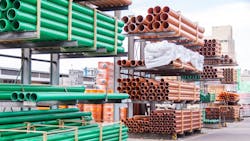Choosing the Right Supplies for Commercial Plumbing Jobs: A Contractor’s Guide
Installing, maintaining and repairing plumbing for commercial spaces takes unique knowledge and experience. In many cases, the choice of materials and supplies makes difference in long-term performance, reliability and safety. By considering these factors affecting supply options, contractors can ensure that they provide the ideal plumbing systems for commercial buildings.
Material Compatibility
When working on a plumbing project in a building with existing plumbing, material compatibility is an absolute necessity. While it is fairly common for plumbing systems to have a variety of materials throughout the system, depending on application, each pipe or joint must fit correctly. Contractors can avoid problems by evaluating the existing system and confirming the materials used for each section. That way, when buying supplies for PVC ball valve replacement or other projects, the materials will fit properly and provide a tight seal.
Complexity
The complexity of the project often calls for unique or creative solutions. Commercial spaces have a wider range of possible requirements, depending on whether the space is designed to have separate plumbing for retail pads or a combined system for a large office building. Contractors need to keep a variety of factors in mind during design and installation, such as cost, efficiency, demand, durability and more. Custom solutions may provide more opportunities to give property owners exactly what they expect.
Demand
Commercial buildings often have a greater number of people using the plumbing, leading to a daily usage that far exceeds the typical use in a residential space. This demand requires attention to the types of materials and equipment that contractors use when designing, upgrading or retrofitting plumbing. Water heaters may need to be larger to handle usage or rely on tankless options that provide a constant stream of hot water on demand. Plumbing materials must be able to handle the higher usage without breaking down as quickly, since they can wear out faster than residential plumbing.
Durability
Given the high usage and the number of people occupying the space, durability is a key goal of commercial plumbing supplies. While PEX or PVC may be the current standard in residential plumbing applications, contractors installing plumbing in commercial spaces need to consider materials that last longer. Polymer-based pipes are more likely to break down and may sustain damage from UV exposure or extreme weather. By comparison, durable materials like copper or cast iron can last decades with routine maintenance.
Efficiency
The efficiency of the system may require a unique design in commercial spaces. Depending on the size of the building, daily usage might run into thousands of gallons or more. Efficient faucets and fixtures can significantly reduce the water usage without leading to a decrease in function. Low-flow toilets and smart faucets minimize wasted water, which can save money as well. Building owners may be interested in installing plumbing systems that increase their efficiency, such as greywater recycling, heat recovery and other features.
Cost Effectiveness
Although commercial plumbing projects tend to cost more than residential jobs, cost effectiveness remains a vital part of the selection of materials and supplies. The larger scope of the project means that the choice of high-end materials and fixtures can significantly increase the total cost of the project. The nature of commercial spaces often require contractors to work during nights or weekends, which also comes at a higher price. When estimating the costs of the project, contractors should talk through options with stakeholders to confirm that material choices are compatible with the total budget.
Ease of Installation
The ease of installation determines the cost of the project as well as the time it takes to complete. Installing plumbing in a completed building creates new obstacles that contractors must navigate. Plumbers have to find ways to remove old pipework and add new materials while minimizing damage to the existing walls and flooring. They must also confirm that new fixtures will fit in the spaces provided. Comprehensive designs can make it easier for contractors to identify structural limitations and find ways to overcome them.
Risk of Damage
With many plumbing fixtures and a complicated network of pipes throughout the building, the risk of damage is a consideration that all commercial plumbing contractors should take into consideration. Something as simple as the ease of accessing a toilet shutoff valve or the water shutoff to the entire building can dramatically affect the extent of damage due to leaks. A thorough evaluation of the existing system or plans for new plumbing can highlight increased risk and provide opportunities to create preventive solutions.
Code Compliance
When selecting supplies for plumbing jobs, code compliance is perhaps one of the most important factors. Building codes for commercial spaces are often stricter than residential requirements, due to the risk involved. Commercial spaces usually have higher traffic, which means more people in the building at any given time. Building codes create requirements that plumbers have to follow to minimize the risk of damage, health effects or injury.
Commercial buildings have unique factors that require plumbing contractors to take special consideration when selecting materials. The right supplies can increase efficiency, durability and compliance, while poor choices may lead to problems down the line. By keeping these factors in mind during the decision-making process, contractors can provide a higher return on investment for themselves and their clients.
For Reference
About the Author
Khris Kaylor
Khris Kaylor is IT Manager at Maxx Supply, a leading distributor of PVC supplies. Kaylor began his IT career in 1995 and holds an MCSE certification. With a decade of experience in POS systems—including installation, programming, training and support—he later transitioned to hardware and software support. Kaylor has also collaborated on managing multiple brand websites within the food and beverage industry.
